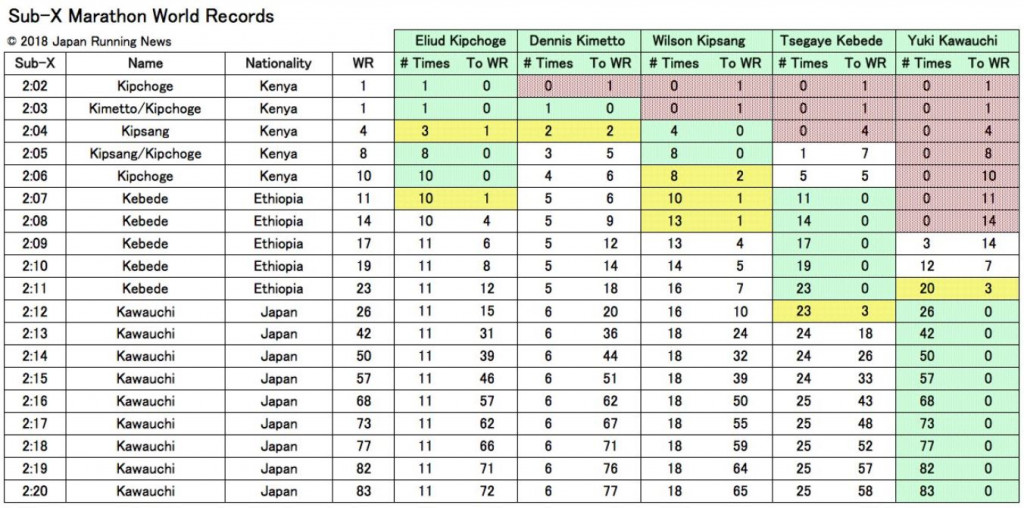WTW: Valencia Keeps Impressing as a Running City, Sacramento is Olympic Trials Qualifying Central, And Who is Running Sub 2:08?
The Week That Was in Running – November 26 – December 2, 2018
By LetsRun.com
December 5, 2018
We apologize for the tardiness in getting this out but our secret staffer in charge of writing this piece was sick. If you missed our coverage of the 2018 Nike Cross Nationals, catch up now: LRC Full 2018 NXN coverage.
Past editions of the Week That Was can be found here.
Questions, comments, or a tip? Please call us at 844-LETSRUN (538-7786), email us, or post on our forum.
LRC Note: It would be hard to compile the WTW without the two statistical services we subscribe to — Race Results Weekly and Tilastopaja.
****
Valencia Impresses Again
“We want the world record.”
Those words were uttered by a jubilant Paco Borao, organizer of the Trinidad Alfonso Valencia Marathon, after Spanish all-comers records were set by two Ethiopians in the men’s (2:04:31, Leul Gebrselassie Aleme) and women’s (Ashete Bekere Dido, 2:21:14) races on Sunday, according to Carlos Fernandez Canet of Race Results Weekly.
Borao had reason to be happy as the depth in the men’s race was unreal. The eighth-place finisher in Valencia, Solomon Kirwa Yego, ran 2:06:21, marking only the second time in history that eight men have broken 2:06:30 in the same race (2012 Dubai was the other).
In the history of the world, only three American men have ever broken 2:06:30, and yet four Kenyans, two Ethiopians, and two Moroccan-born men did it in a single race in Valencia.
? ¿Quieres fotos del #MaratonValencia 2018? ¡Disfruta de las galerías ofrecidas por los medios locales!@RUNNING_CV ➡️ https://t.co/EUvv724h2g@superdeporte_es ➡️ https://t.co/KB03BIPzWH@levante_emv ➡️ https://t.co/5cV2PxZm9x@lasprovincias ➡️ https://t.co/MODmHCwoJy pic.twitter.com/c2UHphOEpQ
— Maratón Valencia (@maratonvalencia) December 4, 2018
###
The fourth placer in Valencia was Ethiopia’s Tsegaye Kebede, who ran 2:05:21. In doing so, Kebede, the 2008 Olympic bronze medallist who has picked up wins over the years in Paris, Fukuoka (twice), London (twice), and Chicago, broke a couple of records.
He’s now broken 2:07 11 times in his career — the most in history, surpassing the 10 times achieved by Eliud Kipchoge (not counting Breaking2), Wilson Kipsang, and Haile Gebrselassie.
Additionally, the 31-year-old Kebede, who hadn’t broken 2:06 in more than six years, also set a record for most time elapsed between sub-2:06 performances (without breaking 2:06 in the interim).
Kebede hadn’t broken 2:06 since 2012 Chicago, when he ran 2:04:38 (it’s probably worth mentioning that he hadn’t even broken 2:07 in more than four years, last doing it at 2014 London when he ran 2:06:30). To be precise, 2,247 days passed between Kebede’s last two sub-2:06 performances. The previous record time between 2:06s was just over five years and belonged to Kenya’s Eliud Kiptanui, who went 1,967 days between the two sub-2:06s of his career, achieved at 2010 Prague (2:05:39) and 2015 Berlin (2:05:21) marathons.
According to Brett Larner of Japan Running News, Kebede is now the outright record holder for most sub-2:07s (11), sub-2:08s (14), sub-2:09s (17), sub-2:10s (19), and sub-2:11s (23). Larner keeps track of those type of stats as he represents Yuki Kawauchi, who has run the most sub-2:12s-2:20s in history. Check out this amazing chart that Larner tweeted out last week.
 Via @JRNHeadlines
Via @JRNHeadlines
###
The sixth placer in Valencia was Morrocco’s Al Mahjoub Dazza, who surprisingly ran 2:05:26 to break the national record of two-time world champ Jaouad Gharib by one second. Coming into the race, the 27-year-old Dazza had modest pbs of 13:18.00, 27:39.79, 61:21, and 2:08:33. It was only the second career marathon for Daaza.
****
A Japanese Man Breaks 2:08 (Again) And Wins Fukuoka
Valencia wasn’t the only big marathon last week. In Japan, Fukuoka was won by a Japanese man for the first time since 2004 as Yuma Hattori ran a big pb of 2:07:27 (previous pb of 2:09:46) to comfortably beat 2016 winner Yemane Tsegay by 1:27. Hattori is now the fifth Japanese man to break 2:08 on the year.
We thought it would be fun to figure out who has the most sub-2:08s by country for 2018. Here are the results.
| # of Men To Break 2:08 in 2018 Kenya 41 Ethiopia 21 Japan 5 Bahrain 2 GBR 1 USA 1 Morocco 1 Tanzania 1 Turkey 1 Uganda 1 Total 75 |
# of Sub-2:08 Performances in 2018 Kenya 51 Ethiopia 29 Japan 5 Bahrain 2 GBR 2 USA 2 Morocco 1 Tanzania 1 Turkey 1 Uganda 1 Total 95 |
Ten Kenyan and eight Ethiopian men have accomplished the feat twice in 2018, as have Mo Farah and Galen Rupp.
****
29 World Records Fall at The 2018 California International Marathon
On Sunday, the US marathon champs were held at the super-fast California International Marathon (CIM). The winner of the men’s race was a big surprise as unheralded Brogan Austin, 27, lowered his pb from 2:24:39 to 2:12:38 to win, passing Matt Llano (2:12:59) just before the 26-mile mark after Llano had led the entire race. You can be forgiven if you’d never heard of Austin before Sunday. He competed collegiately for Drake, where he made NCAAs once in cross country (137th in 2014) but never on the track and had pbs of 13:59 and 29:32. Now training under the guidance of famed LRC poster Tom “Tinman” Schwartz, he lowered his half marathon pb from 64:08 to 62:39 at last month’s Monumental Half Marathon in Indianapolis before his big win in Sacramento.
After Sunday's win at @runSRA_CIM, @brogan_austin is now a national champion. We caught up with him in this #podcast to discuss. https://t.co/sY3lCh2wqj pic.twitter.com/t64LiYOwS5
— Final Surge (@FinalSurge) December 5, 2018
The winner on the women’s side at CIM was far from a surprise as former NCAA 10,000 champ Emma Bates won in her debut in 2:28:18.
Perhaps an equally big storyline nearly every year at CIM is how many people achieve the US Olympic Trials qualifying standards of 2:19:00 (men) and 2:45:00 (women).
If you want to get an Olympic Trials qualifier, CIM is clearly the place to go. The weather is often ideal (this year there was almost no wind, and temps in the 40s at the start, 50 at the finish) and the course features a big-time elevation drop of 105 meters (344.5 feet), which according to John Kellogg‘s formula of every 10 feet in elevation loss being worth 1.8 seconds means that the elevation loss benefits the runners by 62 seconds (the elevation drop makes the course ineligible for world records but USATF still allows runners to achieve Trials qualifiers on it).
As a result, a staggering number of people got the standard. In the men’s race, 53 guys punched their tickets to the Trials by running sub-2:19. But that was nothing as compared to what happened in the women’s race.
In the women’s race, 100 women ran 2:45:00 or faster. The last two women, Tiffany Costello (2:45:01) and Haley Sutter (2:45:07), had gun times over 2:45:00 (their chip times were both 2:45:00), but we hope USATF lets them in. Two of those 100 runners were Canadian, so throw them out and you had 98 Olympic Trials qualifiers in a single race. And CIM pays out $500 to everyone who qualifies. Amazing.
What’s also amazing is how 2:45:00 is the women’s standard and 2:19:00 is the men’s as 2:45:00 is NOWHERE near as difficult for a woman to hit as 2:19:00 is for a man. The women’s standard is 2:45:00 because that’s the Olympic standard and USATF isn’t allowed to have a standard more difficult than the Olympic standard, but we certainly feel for a bunch of low-2:20 men who may think they should be in the Trials.
2:19:00 is only 84.2% of 2:45:00 even though the difference between men’s and women’s world records in track and field is normally around 89%. For the marathon world records, the figure is 89.8%. If we used that 89.8% figure, if the men’s standard is 2:19:00 then the women’s standard should be 2:34:44. If we do that in reverse, and try to figure out what’s the comparable men’s time to the women’s 2:45:00, we get 2:28:14.
At 2018 CIM, the vast majority of the women hitting the standard were running over 2:40:00 (only 33 women broke 2:40:00).
And some of those women are now world record holders of sorts. According to the Association of Road Race Statisticians, the 2018 CIM had the fastest 92nd- through 120th-place finishers in marathon history as the 92nd-97th finishers all ran faster than the corresponding finishers at the 2012 London Olympics and the 98th-120th finishers all ran faster than the corresponding finishers at the 2012 US Women’s Olympic Marathon Trials.
MB: What is the Men’s OTQ (2:19:00) actually equal to for Women?
MB: Brogan Austin proves that slow miles lead to fast times
*ARRS.Run: Best Time For Place- Marathon
*2018 CIM Results
****
Stat of the Week I / Fast 5,000
13:37.33 – fastest men’s 5,000 recorded during the 2017-18 NCAA indoor track season (Mike Tate, Southern Utah).
13:33.64 – time recorded last weekend at Boston University by Campbell’s Amon Kemboi. Kemboi ran that two weeks after finishing 7th at NCAA XC.
15:17.31 – fastest women’s 5,000 recorded during the 2017-18 NCAA indoor track season (Karissa Schweizer, Missouri)
15:14.78 – time recorded by New Mexico’s Ednah Kurgat last weekend at BU. Kurgat and the top four women (Weini Kelati, UNM, 15:15.24; Sharon Lokedi, Kansas 15:15.47; and Allie Ostrander, Boise State, 15:16.38) all ran faster than Schweizer’s NCAA-leading mark from last year (achieved in the same meet). In the process, they recorded the 4th, 6th, 7th and 8th fastest 5000s in NCAA indoor history.
MB: FAST women’s indoor 5k -Kurgat, Kelati, Lokedi, Ostrander all run 15:16-15:14!
To see our favorite reads from other weeks, go here.
****
Quotes Of The Day And Last Week’s Home Pages
To see the quotes of the day from last week or last week’s home page or any home page, go to our archive page.
Got a tip, question or comment? Please call us at 844-LETSRUN (538-7786), email us or post in our forum.

